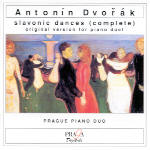Dvorák’s Slavonic Dances exist in two versions: for orchestra, and for piano duet. The easy availability of recordings has rendered the piano scores obsolete, at least for home consumption, but there are plenty of musical reasons to enjoy the pieces in keyboard form. Just turn to Op. 72 No. 3: the opening consists of two distinct lines that, as arranged for strings and winds, almost never sound properly balanced. This problem doesn’t exist with the more monochrome timbres rendered by the piano. On the other hand, it’s clear that Dvorák really did imagine the sound of strings at such warmly nostalgic moments as Op. 72 No. 8; and no amount of pounding can render the frenzy of the final dance of Op. 46 (or Op. 72 No. 7) as well as the full orchestra.
Still, these sensitive, elegantly phrased, and ideally rhythmic performances by the Prague Piano Duo make as fine a case for these versions as we are likely to hear, and they are beautifully recorded. The players don’t try to imitate the orchestra or compensate for its lack, but play each dance as piano music, with a degree of rubato and attention to contrapuntal detail that makes you forget about the existence of the more “public” arrangements–which is entirely as it should be. In a word: delightful.
































